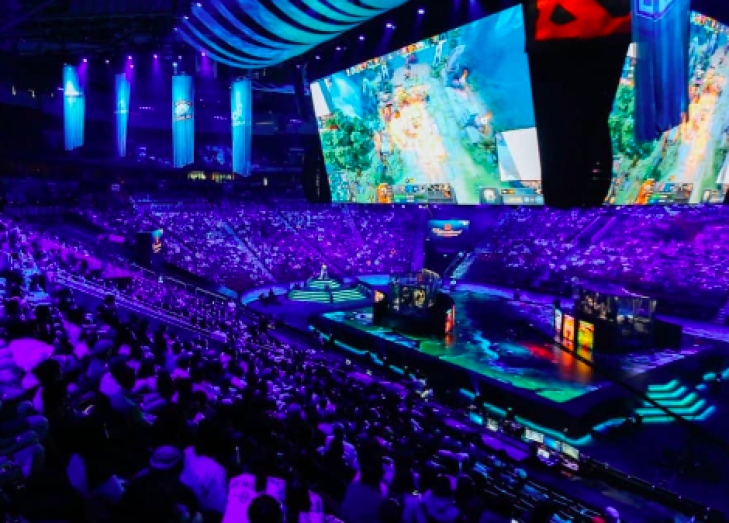Impact of Esports Betting on Casino Revenue
The rapid growth of esports over the last decade has impacted competitive gaming and significantly influenced the casino industry. With growing competition from digital platforms, operators are incorporating esports betting as a new revenue stream. This article explores how esports betting contributes to Divinecasino revenue by engaging a digitally savvy audience, integrating into existing betting structures, and streamlining operations. It also examines the tech, strategy, and regulations behind this shift, detailing both short-term and long-term implications for the casino market.
Background
Before the advent of modern civilization, casinos constructed and developed empires, based on gambling games and sports betting. At the same time, those establishments’ sales and marketing departments were born and perfected over slot machines, table games and even sports bets. The emergence of new forms of digital entertainment, especially the Metaverse, and consumer behavior change threaten traditional revenue streams. While at the same time, the esports industry is experiencing hypergrowth, with viewership, sponsorships and esports participation skyrocketing in much of the world. Betting on esports, once a niche market, is rapidly becoming big business as millions tune into tournaments and wager on competitive video games.
With casinos looking for new ways to grow their portfolios and tap new markets, adding esports to their existing betting products is an important new strategic opportunity to pursue. With casinos already having the infrastructure, clientele, and regulatory frameworks in place, they are positioned to capitalize on this emerging market. Moreover, esports betting doesn't just bring in revenue, it also strengthens customer relations and establishes casinos as a destination for entertainment. This article examines some of the high-level trends for casino esoteric gaming, outlines successful methods for integrating esports betting and highlights some of the challenges and potential DIY paths forward.
The Rise of Competitive Video Games and Their Betting Variants
A Broader Look at Competitive Gaming
From grassroots tournaments more than 10 years ago to securing a place in our global world today, esports is everywhere. Professional teams have been formed, big sponsors attend and the prize pool at many Esports tournaments contains millions of dollars. As a result, tournaments have gathered a considerable following as they can be viewed live on a multitude of sites like Twitch and YouTube. Esports comes alive -encouraged and streaming by the features these platforms offer. With real time comments engaging with the community, esports become even more popular.
Several factors contribute to the rising popularity of esports:
- Modern Technology: Easy access to the game, with the presence of faster internet, improved gaming hardware and advanced streaming technology allowing simultaneous players and spectators.
- Global Involvement: Esports competitions, like matches and leagues, can now attract various audiences globally.
- Interactivity: The engagement with esports events through various platforms and frequent interactions with social media creates a unique connection between fans and community members.
- Public Awareness: Sponsoring events and athletes by popular organizations is making esports more accepted as a competitive sport thus supporting its cause.
Rise of Esports Betting
Esports betting is as popular as esports itself. Associates esports betting with online sites, specific bookmakers but is slowly becoming an established entity in mainstream gambling. This makes it even more common for esports bettors to bet on outcomes such as match results, tournament winners, and specific in-game events. As the traffic continues to flow, these numbers are expected to grow massively over time.
Esports have become quite popular among betting enthusiasts for several reasons.
- Cotest: Esports fans not only know the teams and players well, but also participate in betting tournaments which compel them to engage with the event even more.
- Young Public: The teens make up the largest sector of fans around consoles, game producers and broadcasters, which helps them towards betting and the provisions of online payment methods.
- Flexible betting solutions on many levels of esports, doubling profits for operators compare to classic betting. In addition, even more recent esports pastimes such as 'live betting', 'prop bets', and 'in-game event betting' further add to the streams of monetary revenue for gaming during a time when real world sports are lagging.
- The integration of the betting on esports within the structures of various regulators end up with higher legitimacy for these types of sports. Which is because there is an increasing number of jurisdictions that offer not just legislation but a regulatory structure for esports betting.
Exploiting Existing Systems For Assimilating Esports Betting At Casino Facilities.
All This Was Done By Utilizing Already Existing Frameworks
High stakes betting has been universally embraced with the invention of such complex gaming systems. These systems have long been integrated into traditional casinos, so they can be easily repurposed to cover esports betting. Some examples include:
- Payment Gateways: Traditional brick-and-mortar casinos have established payment gateways that are strong and able to accept monetary transactions in both traditional and cryptocurrency monetary units. One of the most popular forms of payments in esports betting is cryptocurrencies.
- Customer Relationship Management (CRM): In recent years, Casino Relational Management systems have become more focused on retaining and cross-margeting high-value clients to increase casino profitability. And they can fairly easily target the burgeoning esports betting market to provide tailored promotions and customized betting for bettors.
- Regulatory Knowledge — One area that has broad legal requirements are casinos. Their traditional dealing with compliance, anti-money laundering and responsible gaming policies have them ready for them to apply esports betting as permitted by law.
Building a Seamless Customer Journey
One of the most powerful drivers of esports wagering use is the experience that a customer has, reiterating the demand for advanced digital technologies such as real-time analytics and interactivity. Even so, this is precisely why so many casinos are now implementing online systems designed to reach out to both avid gambling fiends and esports fans.
As stated earlier, there are some customer experience gaps already mentioned which include but are not limited to:
- Unified Platforms: With esports betting added to what the modern casino already provides, customers can enjoy the convenience of a unified platform for both digital and physical wagering.
- Cutsomer Experience Features: Customers are supported with streaming statistics, sports commentary, and real-time insights helping them to have dynamic statistics and commentary that facilitate their strategic planning and choice-making.
- Mobile-Based Betting: With a massive proportion of the esports audience consuming content via mobile devices, mobile responsive interfaces were the need! That led to mobile responsive wagering platforms as well because with mobile responsive interfaces there will be mobile responsive wagering platforms.
- Community Features: Forum, chat, and exclusive groups promote customer interaction and improve community feeling. This prompts more customers to place bets.
The Growth Of Variety In Betting Markets
Esports betting has a lot of options that can work in conjunction with all pre-existing casino games. Casinos can be:
- Pre-Match Betting: Just like traditional sports betting, bets can be made on an esports match ahead of their actual game play.
- Live Betting: Betting while a game is being played during attending called as live betting. In contrast to traditional betting, the betting odds are dynamic, continuously adjusting based on in-game activities.
- Prop Bets: These are bets on specific events in the game. E.g. won the first team objective or several total kills by player.
- Long-term: Using advance bets on your entire tournament or league vitória. This enables continuous engagement over time.
Offering these multiple betting options not only attracts a broader market, but increases the profitability of the casino in its entirety.
The Strategic Advantages of Esports Betting for Casinos
Increased Revenue Streams
Esports betting integration with existing casino operations opens them to a new market altogether, diversifying their revenues. Here are some of the grossing benefits:
- Greater Competition for Customers: Placing bets on live esports events opens several venues for wagers during the event.
- Cross Selling Opportunities: Esports betting can boost crossselling with other casino products like sports betting as well as slots and table games.
- Enhanced Customer Lifetime Value: The lifetime value of a customer in a casino is enormously high due to the customized promotional offers and loyalty rewards program which makes customers spend a long duration of time there.
- Microtransactions and In-Game Purchases: Extra revenue can be generated through the sale of electronic items like betting accessories, digital goods, or avatars through microtransactions and in-game purchase systems.
Market Competition
With the sanctioning of the esports betting frameworks, the casinos which integrate these features will have a competitive edge over the online and physical facilities.
- Strategic Innovation: By adopting esports betting, casinos are presenting themselves as modernized venues more relevant to the tastes of millennial patrons and younger generations living in the digital age.
- Customer Base: eSports betting provides a global fanbase to attract new markets and segments that would not be reached through traditional betting.
- Customer’s loyalty: Due to esports introduction in betting, Customers driven deeper immersion and interaction leading to more spending and loyalty to the particular casino.
Business Algorithms with Intelligence
Especially with the rise of esports betting, integration of these platforms is endless possibilities. Because the data collected from it are plenty. The insights from this data can be used for marketing, operations, and customer relations to better cater to customer preferences.
- Tactical Marketing: Access to detailed data on betting activities, preferred matches, and players gives casinos the ability to market targeted products and to adjust their offerings.
- Competetive Strategy: Live data streams allow for tracking not only betting volumes and market activity, but also customer satisfaction of the casino, allowing management to quickly adjust the operational strategy.
- Esports Betting Analytics: High-level machine learning frameworks tailored specifically for esports betting can help with prescriptive analytics for actionable intelligence and strategy building.
Case Studies and Real-World Applications
Case Study 1: Betting on Esports Integration on Global Scale
One casino's integrated betting system includes esports as a distinct betting type. A globally recognized gaming establishment, the venue has added a complete esports betting console to its already extensive suite of virtual games that appeal to a cosmopolitan base of esports enthusiasts. Besides the Pre-Match and Live betting for the esports games, the casino provided seamless payment options which allowed for instant deposits and withdrawals after playing. The casino has grown its holistic betting volume around 25% on a yearly basis, significantly driven by the evolving attributes of its younger patrons. Not only did this integration grow revenue, but it also changed how the perception of the Casino as an old establishment went along with using systems, accepting innovations, marketing new initiatives, and boosting its reputation.
Industry Case Study 2: Leveraging Cross-Promotion
Another casino chain announced a partnership with a top esports organization to hold a series of betting events connected to major esports tournaments. The casino managed to gain new customers interested in both traditional casino games and also betting on esports events by showcasing these events at their physical and online storefronts. This initiative led to a 30% increase in customer retention, and also a significant increase in average spending per user — demonstrating the impact of cross-promotional initiatives on improving user engagement and revenue.
Case Study 3: Optimize for Mobile-First Esports Betting
Mobile casino operator creates trusted esports betting mobile app They knew how mobile devices were being used to attend events as well, and they've woven their app into things like active odds updates, streaming of events, and chat functionality to enhance the user experience. In the six months since it was introduced, mobile betting is up 40%, especially among younger users. This case illustrates the significance that mobile technology is playing, not just in reaching new demographics but in keeping a sustained audience engaged.
Challenges and Considerations
Regulatory Complexity
There are numerous challenges for the tightly regulated gambling market regarding the implementation of esports betting:
- Evaluating Licenses and Legal Compliance: Many of the regions have separate regulation for online, and esports betting. This entails contending with complex licensing frameworks and compliance across significant geographic footprints.
- Responsible Gambling Practices: Sound gambling policies need to be implemented like in any other kind of betting to prevent addiction and protect vulnerable customers. The self-exclusion mechanisms and monitoring systems must be developed and made operational for preventive measures.
- Privacy and Data Security: The processing of large volumes of data regarding personal information and finances requires robust cyber security frameworks, and abidance to data laws like GDPR.
Technological Barriers
There are many challenges from a tech stack perspective when developing an advanced esports betting platform:
- Expandabilities: As there are a large number of other ongoing simultaneous tournaments, the platform is expected to witness high traffic for a lot of data transactions and feeds to be processed. There is a significant cost in processing more in the cloud, with resources that are easily scaled to demand.
- User experience: Above all, ensuring a seamless user experience is one of the key features of the platform. Even casual bettors can expect to be able to see live data and access a betting interface and any social elements that also need to be considered as part of the design.
- Legacy System Integration: The majority of casinos still run on outdated systems which could demand expensive upgrades or middleware to integrate to other services like esports betting.
Market Competition
With the increasing attraction of esports wagering, the competition is intensifying in the marketplace:
- Threat from Startups: The service has been in great demand recently, so esports specific platforms developed by other entrepreneurs are springing up, along with the betting sites we mentioned earlier.
- Customer Trends: Customers are less forgiving of not engaging with them and personalising their wagering experience. You need to continue innovating and devising better solutions to cater to that growing demand.
- Branding Value: Given that the market is full of casinos, a good identity as a Brand is what matters the most. They have to sell themselves intelligently all whilst offering cutting-edge technology and great customer care.
Future Trends And Opportunities
Advancements in Technology
The evolution of technology goes hand in hand with the future of esports betting:
- Artificial Intelligence: AI and machine learning will further optimize promotional analytics and personalized betting encounters, as well as increase the use rate and income potential.
- Augmented and Virtual Reality: VR and AR could redefine the esports betting process by providing real-time exposure and interactions that fashion digital and physical worlds into one.
- Blockchain: The application of blockchain will improve the transparency and security of betting transaction by providing a verifiable record of all active processes and increasing trust among bettors.
Expansion of Betting Markets
Esports on a global scale offers remarkable opportunities for marketing expansion:
- New Demographics: Online video gaming continues to attract younger audiences. Most of these kids are not represented in the casino market.
- Emerging Markets: Southeast Asia and Latin America have growing access to the internet and interest in esports which makes these areas ideal for market expansion.
- Diversification of Betting Options: Development of betting options, especially in-play bets, prop bets and fantasy esports, are expected to flourish this sector.
Improved Integration with Other Services in the Casino
Additionally, operators can gain a competitive edge by offering esports betting alongside the traditional casino games.
- Promo Opportunities: Integrated systems can promote crosstalk between esports and traditional games and will strengthen customer activity.
- Single Loyalty Program: With a single loyalty program for both traditional and esports betting we will also improve customer retention and the amount of value we receive from them.
- Omnichannel Experiences: Gamblers' ability to easily transfer between in-person and online casinos will be a key aspect of complete gambling service going forward.
Conclusion
The esports betting industry is evolving at an unprecedented rate, driven by the growing demand for esports betting and its integration with global gaming markets. By 2024 and 2025, the global esports betting market is projected to grow significantly, with a notable compound annual growth rate (CAGR). This growth is fueled by increased interest in esports titles like League of Legends and Dota 2, which dominate the esports betting landscape. Market insights from recent esports betting market reports indicate strong market segmentation, highlighting key opportunities for industry players.
The esports sector has transformed the betting industry, combining traditional online sports betting with the dynamic appeal of esports competitions. Online gaming platforms are increasingly featuring games like League of Legends and other multiplayer online battle arena titles, expanding market size and creating new esports betting opportunities.
What Caused the Rapid Growth of the Esports Industry?
Over the last decade, esports has grown to become an extremely sought-after industry. So what caused this incredible popularity to rise? Several key factors have helped the rapid growth of esports and made it a dominating force in the entertainment world.
Salient Factors
1 . Online Gaming Ascension
Esports has become a major success because of online gaming. With the high-speed internet developed, players from all over the world can play against each other in real time. This has allowed the creation of a global esports community where players and fans can join, interact with, and play with each other.
2 . Streaming Platforms and Content Creators
Esports have really been boosted by the introduction of live-streaming platforms, such as Twitch, YouTube Gaming, and Facebook Gaming. They provide fans with the chance to watch professional players, learn new skills or the new Fortnite, and talk to their favorite gamers. Esports is largely promoted among streamers and content creators by providing engaging content and creating a dedicated fan base.
3 . Major Investments and Sponsorships
Esports has already been identified by big companies, and they invest a lot in this area. Brands like Coca-Cola, Red Bull, and Intel sponsor major esports tournaments and teams. Esports has been able to grow as event production improved, prize pools increased, and professional players had better opportunities due to this financial support.
4 . Cut-Throat Tournaments and High Rewards
Millions across the globe used to tune in to esports tournaments. World competitions like The International (Dota 2), League of Legends World Championship, and CS: GO Majors in fact have prize pools that go up to multi millions of dollars. Interestingly, these high rewards will help attract more players to take their time and become professionals.
5 . Burgeoning online gaming platforms
Gaming platforms are one of the growing trends in online gaming. There are various leading gaming platforms, such as jalwagame.bet, which let gaming enthusiasts enjoy esports in exciting new ways. It makes the industry that much more entertaining and financially involved as well.
6 . Technological Innovations
The growth of esports has also been fueled by the development of powerful, highly powerful gaming hardware and software. Gaming consoles and high-performance PCs gain the smoothness and immersion of gaming with VR technology. Advanced AI and machine learning also help with improving matchmaking and gameplay in esports to be more competitive and entertaining.
7 . Global Recognition and Media Coverage
In conclusion, as online gaming, streaming platforms, sponsorships, tournaments, and technological developments have improved, the rate at which esports have been growing is extremely fast. With this, the industry will attract even more players and viewers as well as investors. Going forward, esports have the potential to continue growing and innovating in every possible way.
Can Digital Games Be Included in Sports?
The definition of sports has evolved through time as physical pastimes, including football and basketball, gradually expanded to include chess among other not-so-traditional sports.
Digital gaming has grown rapidly, so experts now debate whether the virtual world meets the criteria to qualify as a sport.
Digital games should be recognized as genuine sports because their strategic gameplay and competitive elements prove their status as proper athletic events.
What Defines a Sport?
Digital games need proper assessment to establish their status as sports varieties. Traditionally, sports involve
- Athletes participate in extensive training to establish effective game strategies that enable better opponent victories.
- Competition: Organized leagues, tournaments, and rankings structure sports.
- A sport's emphasis can be on physical dexterity along with endurance, such as running, but also on mental dexterity, as seen in chess.
- Sports engage audiences as an entertainment through human attendance and media broadcasting.
The criteria for being a competitive sport are satisfied in digital games, as they attract vast audiences to watch esports tournaments.
The Rise of E-Sports as a Competitive Field
Electronic sports represent a professional development of digital gaming that has established structured competitive competitions. Esports athletes follow the same pattern as traditional sports competitors through daily training sessions that build their strategic skills together with reflex development for participation in high-value competition events.
Whether you’re a casual player or an aspiring pro, you can play exciting games on the BHT Club games and experience the thrill of competition.
Dota 2 and League of Legends, along with Counter-Strike: Global Offensive and Valorant, collect wide global viewer audiences while attracting multi-million-dollar prize money distribution.
E-sports leagues operate just like their traditional sports league counterparts through their establishment of professional teams and sponsorship contracts as well as specialized training facilities. The academic sphere supports the competitive nature of video gaming through scholarship programs at various institutions that back digital gaming as an authentic competitive field.
Recognition of Digital Games in the Sports World
Major organizations now acknowledge digital gaming because it has become a popular mainstream activity.
During the Asian Games 2022, e-sports earned the status of a competition that awarded medals. The International Olympic Committee is researching possible methods to integrate virtual competitions into e-sports after examining their potential integration.
Worldwide educational institutions, together with governments, have established e-sports programs that demonstrate the status of digital gaming as a competitive sport.
Gamers now benefit from easier access to competitive gaming through the efforts of gaming platforms. All players from any level of experience can enjoy thrilling contests and seek the competitive joys of various platforms.
Conclusion: The Future of Digital Games in Sports
Modern sports identity shifts toward acceptance of digital games as they establish themselves as competitive options in sports. E-sports features formal league play including professional participants together with increasing spectator engagement, thus matching several traits of conventional sports events. Technology developments could make digital games establish themselves as a central component of worldwide sports business operations.
Why Should Esports Be Considered a Sport?
Sports now extend beyond physical competitions because chess and motorsports represent intellectual contests among other mind-intensive events. The modern world actively debates whether esports should receive status as an actual sport.
There are critics who state video games lack physical activity, but esports fulfill most standards that define competitive sports, including abilities at play and strategic thinking, along with team composition and viewer interest.
Esports deserves to be recognized as a valid sport based on the existing criteria. The following text explains the reasons behind this positive reply.
5 Reasons Why Esports is Considered A Sport
1. Esports Requires Skill and Training
Sport demands training and practice to develop necessary skills because this stands as a fundamental sport requirement. Professional esports players devote long hours each day to practice since they must develop their reflexes, understand game strategies, and work as a team.
Esports players mimic traditional sports athletes because they organize practice activities and study gameplays as well as opponent strategies to secure better results in matches. A competitive environment exists in games including League of Legends, Dota 2, Counter-Strike: Global Offensive, and Valorant.
Which require players to demonstrate top athletic abilities such as exact hand movements, swift choices, and enduring mental strength.
2. Esports Involves Organized Tournaments and Leagues
The key element of sports includes organized professional leagues combined with tournaments. The esport industry has built worldwide competitive infrastructure through several events including:
- The International Dota 2 stands as one of the premier esports tournaments that distributes multi-million-dollar prize payouts.
- League of Legends World Championship—Attracts millions of viewers worldwide.
- The Fortnite World Cup presents athletic competitions that enable young video game players to take part in professional gaming.
In fact, players can even earn money while gaming through competitive play, sponsorships, and streaming platforms
3. Esports Demands Physical and Mental Endurance
Many people oppose esports sport classification because their activities appear to lack physical activity. Regardless of the different requirements between esports and running/swimming, professional gamers suffer strain due to their extensive periods of extreme gameplay.
Gaming professionals cultivate their reaction speed together with their accuracy and endurance to handle stressful moments on the playing field. The athletes train both their bodies and minds to minimize exhaustion while sharpening their concentration and stress management abilities in ways similar to typical athletes.
4. Esports Has a Massive Audience and Economic Impact
The competitive aspect of sports represents only one part of their dynamic because fans form an integral part of their success. The streaming platforms Twitch, YouTube Gaming, and Facebook Gaming deliver live matches to viewers from all across the globe who watch millions of esports spectators each day.
The major esports competitions draw crowds that match or exceed traditional sports championship numbers because they occupy complete stadiums.
The peak viewer count for the League of Legends World Championship in 2021 surpassed traditional sports tournaments when it reached 73 million spectators. The esports industry provides a sustainable career path for youth gamers who seek financial rewards as their profession.
5. Esports Is Gaining Official Recognition
Esports has achieved formal organizational approval worldwide during the last few years:
- The Asian Games 2022 included esports as a medal event.
- The International Olympic Committee (IOC) is exploring esports integration.
- Governments and universities worldwide are introducing esports programs and scholarships.
Final Words
Traditional sports qualities, including talent development along with competitive formats and teamwork, appear in esports through the elements of skill and teamwork combined with physical endurance and audience interaction. Its place in the sporting world becomes stronger thanks to the developments of professional leagues and mainstream recognition events in addition to global tournaments.
What Sets Competitive Online Sports Games Apart?
Online sports games have really gained popularity and have transformed the whole aspect of the gaming sector. They offer the players the possibility to compete in games that are very related to sports and which let them experience new emotions.
The following aspects are highlighted to differentiate these games and improve the fun and satisfaction of the players.
Realistic Gameplay and Graphics
Technology has enabled game developers to develop games that are very realistic in terms of graphics and physics. Players can view the details of their favorite sports, from how the players move to the dynamics of the game environment. Realism enhances immersion, where the player feels he or she is part of the actual sport.
Variety of Game Modes
Competitive sports games would come with multi-mode types, with different player preferences, like multiplayer games between real and AI players. This can increase the replay value or depth of the game since the gamer needs to try so many other elements.
Competition with other users all over the world is another vital feature of these games. Multiplayer in online modes allows the player to test his skills immediately, climb to the top on leaderboards, and participate in global tournaments.
Scheduled Updates and Live Content
Updates usually refer to current sports events, player statistics, and seasonal changes, which developers regularly update. The live content approach ensures the game environment is constantly changing. Therefore, it is always relevant to returning players, as they get challenged by new features and problems.
Skill-Based Matchmaking
Many games carry out skill-based matchmaking techniques to ensure equal competition. This is a system of matching participants that aligns them with other players of similar skill levels. This ensures balanced and competitive gameplay experiences. This keeps the interest and satisfaction of the players since the matches are not too easy or too challenging.
Integration of Esports
Esports have greatly influenced competitive online sports games. Official leagues and tournaments can be found in most titles, providing opportunities for the best players to compete professionally. This integration has brought a more competitive edge to the games, and players take their skills more seriously and look forward to the prospect of going professional.
Customization and Personalization
This has resulted in many being able to enjoy the personalization options in a game. Such examples include avatars, designing specific team kits, or changing graphics settings. With increased personalization options, a player's interest is sparked, as the gamer gets a chance to show creativity and style in the game.
Rewards and Progression Systems within Games
Incentives such as virtual money, attractive skins, attire, or enhancements encourage gamers to continue playing and pursue milestones. Tense progression systems that track and motivate the player’s achievement offer a taste and meaning of the game so that the player will be motivated to play for a longer time.
Beyond Chance: The Allure of Skill
New lottery-style games, including those provided by SonsyGame.games, make competitive online sports games extremely skill-based games. The game is played between the players and involves critical thinking among the players, besides the players having to make a quick decision. This makes the experience of gaming so much more thrilling, thereby turning the game of luck into a contest of the brain.
Community Engagement and Support
The keys to success for competitive online sports games are mainly the active communities, forums and interaction with a developer. It offers the opportunity for people to report what is going on and debate strategy; to get ideas and to respond to them. Maintenance and continued interaction by the developers will also increase confidence and, therefore, brand loyalty.
Conclusion
The range of realistic gameplay and added modes places these sports online games into the competitive field with their addition of online options. All these elements complement each other to make what many can easily relate to and hence enjoy.
Top 7 Competitive Sports Games for Esports
1. FIFA Series
FIFA is one of the oldest and most popular games in the sphere of esports due soccer’s pre-eminence as a foremost sport in the world. Filled with detailed gaming sequences, life-like graphics, and realistic game mechanics, the game delights everyone, gamers and lovers of the show. Users are able to manage their teams as well as individual players, and make real-time decisions to win big.
2. NBA 2K Series
Basketball fans turn to the NBA 2K series for these reasons: innovative features and high levels of realism. Considered as one of the most realistic recreations of NBA teams, players and arenas, the game lets esports athletes bring their best for major championships.
3. Rocket League
Rocket League takes the concept of soccer to new heights featuring actual cars racing around a court at rocket speed. A novel feature is that the title combines simple controls suitable for learning and quick gameplay even from a smartphone with the depth and intricate mechanics for regular electronic sportsmen.
4. in333 Games
For anyone interested in diving into a brand new gaming environment that contains a broad selection of sports-based esports titles, gaming with in333 should be something you should explore. From soccer to basketball and beyond, the platform provides competitive gaming experiences that appeal to both casual players and seasoned professionals. Due to having its own features and heated competition in tournaments, it has become a favorite platform for esports.
5. Madden NFL Series
The Madden NFL series allows fans to play American football as it is. A player can hire his/her own players and even perform big strategies, stunts and is able participate in some of the biggest online tournaments seen in the sports gaming industry.
6. eFootball (formerly PES)
Another soccer-based game is eFootball, previously referred to as Pro Evolution Soccer (PES); It is a different game from FIFA because while it focuses on the mechanics’ abilities to deliver tactical gameplay and fluid move, it still gives the game the right level of intensity.
7. Tennis Clash
Games played on mobile devices are slowly becoming adopted in esports and Tennis Clash is an example. This mobile sports game is also free to play and lets the users engage in match play anytime from any device.
Conclusion
Competitive sports games have become an integral part of the esports landscape, blending the best of traditional sports with the fast-paced action of gaming. All these games are ideal for competition, entertainment or even watching as you watch other competitors play competitive sports games. Submerge yourself in these games and get a feel of the same competitive, tactical and the adrenaline rush that defines sports games as one of the main facets of the esports industry.
How Can Esports Careers Be Profitable?
Esports has fascinated many users in recent years. The uptrend in Esports has brought people together beyond geographical borders to form online communities. Live streaming and competitions have created a buzz around the world to make esports a trending business platform.
Have you ever wondered how you can make esports a profitable career?
Let us discuss it!
How to make esports a profitable career
Esports companies do not reveal their revenue reports to the public. The reason behind hiding revenue reports is a lack of understanding of the financial part of esports.
To gain profits in esports, one has to be very patient in the initial stages. Consistent efforts are required to uplift careers in esports. Esports teams generate money through esports tournament prize money, live streaming, content creation, merchandise, and sponsorships.
Tournament Winnings
Before the rise of esports culture, players used to play individual games on various gaming platforms to earn money. Games like Color Prediction, Hot Spin, Limbo, Fishing Wars, Teen Patti, and Aviator are examples of money-making games.
Some gaming apps even offer all these games in one place, providing players with multiple gaming options. Those interested in playing a variety of money games in one place can access Diuwin Game to play color prediction games and win form invites.
However, esports tournaments have emerged as the easiest way of making a profit, despite the winner. You may not win the largest prize pool, but you can gain profits from tournament funding. If you win, you can make huge profits from the winning amount.
Sponsorships and Partnerships
The growing viewership of esports has created multiple options to make money other than winning prizes. In the esports industry, sponsorship plays an important role in generating substantial profits. Brands realize the importance of esports and are eager to feature their business within the esports community.
Most electronic and hardware companies sponsor esports tournaments, which become a profitable source of income. Adidas has sponsored esports teams like G2, 100 Thieves, and North. NSI was the official gaming partner of the 2023 PUBG Global Championship.
Partnership Streaming
Esports teams hire popular streamers to promote the tournament instead of investing their money solely into players. The streamers can attract the potential audience into game streaming, which makes it an ideal platform for investing.
The partner streams help pull more audience which indirectly helps to gain profits.
Merchandise Partnership
Merchandise can also create revenue for the esports industry. Organizations like Cloud9 can sell merchandise for the esports industry to gain profits.
They have a huge fan following, which benefits the esports industry to a great extent. People want to be a part of the team, so they like to purchase their favorite team's merchandise.
Game Development and Design
You can gain profits in the esports community by programming or designing games to license or sell. You can be an independent game developer to make profits if you have a career in game development and design.
The Bottom Line
The Esports industry has a lot of scope for enthusiasts who want to make a profitable career in this industry. However, you have to be very patient to understand the marketing trends to benefit from the esports industry. Being patient will also help you make measurable profits from game streamings, sponsorships, etc.
eSports Betting & Data Privacy: Is It Possible To Bet Without Sharing Your Personal Information
Although traditional sports betting is still extra popular, eSports wagering confidently catches up. According to statistics, the eSports betting market is projected to generate a revenue of up to US$2.13bn in 2023.
At the same time, the experts suggest an overall revenue of about US$3.17bn by 2027 (given the CAGR of 10.45%). Compared to a traditional variant, eSports betting implements all the latest trends and technologies that help attract new clients and keep regular ones engaged.
Anonymous wagering is exactly one of those trends that is developing as a response to multiple bettors who prefer to hide their personality and their activity online.
The Landscape of eSports Betting
All modern eSports betting platforms can be divided into 2 groups. The first one is more traditional, where you must provide personal data according to the AML/KYC policy to start betting and withdraw winnings. The second group unites sites (often those that support cryptocurrencies) where you can enjoy betting without revealing your ID at all. You can easily try NonGamStopCasinos no ID sportsbooks to try this option and only then make a decision about what’s better for you.
Traditional eSports Betting Platforms
Within conventional eSports betting platforms, you can register using email/phone number or even via an account on social networks. Then, you can make your first deposit and start wagering. But to withdraw winnings, you must pass the ID verification by uploading documents like a passport or ID card.
Also, they require you to provide proof of your money source (bank card or bank account statements) and physical address (copy of a utility bill). On the one hand, you have to reveal your ID details and sometimes wait longer until you get winnings on your bank card. On the other hand, you may also expect better protection of personal data and quick resolution of any dispute situations.
The Rising Interest in No Verification Betting
Wagering at no-verification eSports betting sites, you do not have to pass long and boring ID/payment data verifications, upload scans/copies of documents, etc. After registration, you may deposit, bet, and withdraw without revealing your activity.
Often, these crypto sites use the advantages of virtual money (decentralization, no controls by third parties, etc.). Such sites have quicker withdrawal speed, tempting promotions, higher odds, and better accessibility. As for cons, such sites often do not support Responsible Gambling rules and are more often exposed to hacking attacks and malicious activity.
Data Privacy Concerns in eSports Betting
When speaking about traditional and no-verification bookmakers, it is always about data privacy concerns. Bettors should decide on their priorities: more free and risky wagering or betting within strict frames but in a 100% secured environment
The Importance of Personal Data in Betting
Personal data is collected during the registration (phone number, email, full name, etc.) and verification stage. The second option is important for successful withdrawals. You must provide copies/scams of your passports or ID, bank card data (or bank account), and the current physical address.
A bookie’s specialists verify the data to prevent involving minors in betting. Also, it is necessary to stick to AML policy rules to prevent sponsoring terrorism and other illegal activity.
Data Privacy Regulations and Compliance
There are basic norms associated with GDPR that a reputable bookmaker must adhere to. At the same time, there is always room for interpretation depending on the sportsbook’s location, servers where data is stored, and the data itself.
As a rule, almost any bookmaker sends data abroad (using verified transfer protocol), where they are kept in cloud storage. To ensure the data is permitted according to GDPR, ask 2 simple questions:
- Does the bookie transfer info to the approved country?
- Does the bookmaker support Standard Contractual Clauses?
In case of violation of basic rules, bookies risk getting serious penalties and sanctions.
Exploring No-Verification Betting Options
While choosing a no-verification bookmaker, you should realize all the pros and cons. Along with better convenience and accessibility, you may face a lack of security measures and problems with the Responsible Gambling policy.
Benefits of No-Verification Betting Sites
Among the clear advantages of no-verification sites is anonymity. You do not need to provide the same data as you do at conventional bookmakers (payment details, copy of passport, etc.). Also, bettors highly evaluate enhanced convenience when you can register and start wagering in a couple of clicks.
In case of cashing out, you do not need to wait for a long time until the bookie’s experts verify your data and allow the transaction. Also, there are no restrictions on specific categories of bettors who can register.
Risks and Challenges
Along with advantages, users of no-verification bookies should be ready for security concerns. There may be problems with HTTPS or a lack of SSL encryptions. Thus, your data may not be sufficiently protected while traveling from your end to the bookie’s.
Another problem is legality. Such sites often do not have a license, which means they do not operate according to the strict rules of a particular authority (UKGC, MGA, etc.). This may cause problems in resolving disputes.
Finally, no-verification sites often do not have an internal self-exclusion program and do not perform account monitoring. It may lead to problems with gambling addiction among vulnerable bettors.
Conclusion
The share of no-verification betting sites is growing since they are convenient and highly accessible. They do not set strict restrictions on registration and allow you not to reveal your ID while betting.
Often, such sites provide hassle-free withdrawals where you do not need to provide payment details in advance. At the same time, bo-verification bookmakers are associated with a higher risk of malicious activity and legal problems.
Moreover, vulnerable bettors can barely find a reliable internal self-exclusion program or any tools for account blocking or deposit limits.









